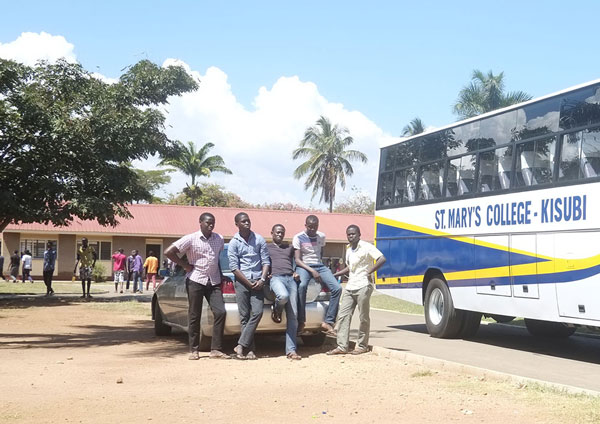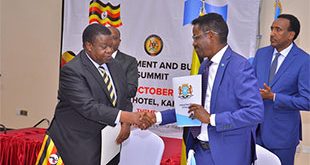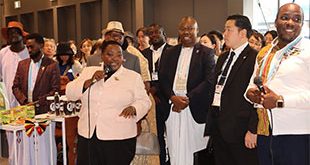
Up to 74% of government-aided schools are owned by non-state actors like communities and faith-based organizations – the Catholic Church and Church of Uganda, and Muslim Supreme Council
Kampala, Uganda | THE INDEPENDENT | The government has asked all foundation bodies that own primary and secondary schools, to implement a no-fees policy or lose all forms of grants and funding. Government has also abolished admission fees, examination fees, PTA and insurance fees.
Dr. Joyce Kaducu Moriku, the State Minister for Primary Education, said this is one of the decisions taken by the Cabinet on Friday. She noted that the move is to ensure that Universal Primary Education and Universal Secondary Education are completely free.
“All schools must adhere to the no school fees policy when implementing the UPE and USE programs. Failure to comply will result in the government withdrawing its support for those schools. This decision has been made and we will soon engage in discussions with foundation bodies regarding this matter,” the minister noted.
The minister added that in the coming days, there will be talks between the ministry and the foundation bodies about the decision taken by the government and those who will not be comfortable are free to pull out of their schools from the UPE and USE programs.
The majority of government-aided schools accounting for above 74 percent are owned by non-state actors like communities and faith-based organizations; the Catholic Church and Church of Uganda, and the Uganda Muslim Supreme Council.
From ownership of the school, it is evident that if the government implements free education, it should be accepted by the foundation bodies who have reportedly at times influenced charges and fees levied in these schools using the school boards and management committees.
During the 1960s, the then government-nationalized all schools, including those owned by foundation bodies. However, the NRM government later regained ownership of these institutions. But, when the UPE program was introduced, the government had little or no schools in many areas and therefore co-opted non-state schools in the aiding arrangement.
Kaducu also pointed out that public and government-aided secondary schools that have not been implementing the Universal Secondary Education-USE program, commonly referred to as non-USE schools, will be asked to implement it and failure to comply may result in the withdrawal of government funding.
According to records from the Ministry, there are 105 government-aided schools in the country that are not currently implementing the policy of free education.
These schools are mostly traditional schools, such as Ntare SS, St Mary’s College Kisubi, King’s College Budo, Mengo SS, and Mbale SS, among others.
The government has been subsidizing education in these schools by paying teachers, providing grants for classroom construction, and providing laboratory equipment, textbooks, and other items.
Despite receiving government funding, there has been a public outcry against these schools for charging high fees and imposing unreasonable policies on students and parents, as if they were fully private institutions.
Kaducu states that the government has also abolished any charges that can be imposed by schools or parent-teacher associations, including admission fees, examination fees, PTA fees, insurance, and others.
The minister noted that many school administrators have been concealing additional fees despite claiming not to charge tuition or school fees. This becomes clear when examining circulars from government schools, which state that education is free but requires students to bring items and pay for other charges, which can amount to millions of shillings.
The idea to scrap all forms of school fees for learners in public schools was among the list of proposals in the education sector highlighted in the party manifesto for 2021 to 2026.
Although Education is free, some children fail to access it because of additional charges, especially uniforms, lunch, and PTA (Parents Teachers Association). According to the manifesto, there should then be no excuse whatsoever for any child of school-going age to be out of school, since even pregnancy is no longer a grounds for leaving school.
As the government removes all forms of fees in UPE and USE schools, parents have been informed that they are responsible for providing food for their children. According to a cabinet brief seen by this reporter, the government has decided that learners will be carrying food from home.
Kaducu noted that this is the best way to avoid schools exploiting loopholes to charge heavy fees to learners. She says allowing schools to charge feeding fees could lead to abuse and a financial burden on parents.
However, this will be a U-turn by the government since it had promised Ugandans that if it was re-elected to power, there were to implementa national school feeding program, improve the nutrition and health of school-going children and generate wealth for farmers all over the country as it creates demand and create a market for agricultural produce.
Regarding school uniforms, the minister noted that parents will be responsible for providing them, but schools will not require parents to purchase them from the school. This means that once the color is known, parents will be free to have them made by a tailor of a parent’s choice.
Regarding boarding fees, the Ministry notes that the government does not operate boarding sections, and if a school wishes to do so, it must first obtain clearance from the ministry. The fees to be charged for boarding will then be negotiated between parents and schools.
Although the government has passed the resolution, it will be implemented in the 2024/2025 financial year, which is essentially the second term of 2024. According to the cabinet briefing paper, the delay is intended to give the government ample time to address a number of challenges faced by schools.
Some of the challenges that will be handled include constructing primary schools in all parishes that do not have one and secondary schools in sub-counties without one.
Data shows that there are currently 1,617 parishes without a public primary school and 350 sub-counties without a secondary school. To effect this government will require 1.98 trillion Shillings to construct primary schools at a unit cost of 1.2 billion Shillings per school.
The government also intends to recruit more than 78,880 primary school teachers to meet the target of a 1:40 teacher-pupil ratio. At the secondary level, where teachers are said to be enough to meet their required ratios, the government is going to use the coming year to rationalize and redistribute them across the country.
Kaducu also stated that the government intends to increase the entire education budget by increasing capitation, construction grants, inspection funds, and other items.
While the government has passed a no-fees policy in its schools, it remains undecided on the regulation of school fees in private schools. The minister noted that the ministry is still discussing this matter before a concrete decision is taken.
******
URN
 The Independent Uganda: You get the Truth we Pay the Price
The Independent Uganda: You get the Truth we Pay the Price





This is a fantastic move by the government of Uganda . At least at last. You have woken up from a deep slumber after these hungry school managers have stolen enough from us the parents.
. At least at last. You have woken up from a deep slumber after these hungry school managers have stolen enough from us the parents.
May God the cabinet that have come up with this healthy decision. We only pray that it should be implemented as soon as possible. May God bless Uganda
FOR GOD AND MY COUNTRY
Interesting aritcle, also like the follow up article https://www.independent.co.ug/govt-cautions-on-takeover-of-new-schools-amid-funding-shortages/ that shows again that a lot is said, but money is always vanishing…
I built 3 schools in Uganda so far and the costs of 1.2 billion Shillings per school is far off (4 Mio UGX = 1.000€). 2-3 years back you built 1 classroom for around 14 Mio UGX (=3.5k €), now with inflation and if you want to build a robust structure you need to aim for 18-21 Mio UGX per class room.
A Primary School has 7 classes, you need toilets, kitchen, admin block, maybe a resource room or library, a playground, fencing and maybe the property.
All in you can built a pretty decent primary school for around 250 – 300 Mio UGX and we are doing that. So the 1.2 billion shillings have a lot of money included that vanishes as well.
I am actually in search for another topic. My partner in Uganda told me that Ugandan government is currently nationalizing secondary schools from third parties like churches (christian and muslims) as well as private schools.
Yet I could find something on it in the internet (just that this happend in the 70s already once and then was partially given back). So mabye you can investigate this and write a follow up article if this is really true.
Best and thanks
Hannes